- Home
- Todd Strasser
Price of Duty Page 7
Price of Duty Read online
Page 7
And not the first time the Liddell name and that word have been linked.
Brandi screws up her face. “How could it be treason? You’re a—”
I hold up my hand. I’ve heard the h-word enough, and that’s not the point. “There are thousands of minorities and whites who’ve gone through JROTC and are glad they did. Some went into the military, but a lot didn’t. Look at it this way. JROTC gives students a taste of the military without them having to commit to it for two years. You can’t say that’s a bad thing.”
Brandi scowls and pulls her lips in, but doesn’t argue.
“And there’s another reason,” I continue. “I can’t do it to my family. And I can’t do it to the families of all the soldiers who went through JROTC and into the military and never came home. You’ve got one side of the story, Brandi. And you’re right. It’s definitely a side more people should know about. But it’s not the only side.”
Out of the corner of my eye, I see Lori’s Honda pull up outside. I grab my crutches and start to get up. Brandi looks startled.
“Good luck with your video,” I tell her. “And thanks for the coffee.”
ALJAHIM
The two insurgents, one with an AK, the other with an RPG launcher, are still creeping along the wall toward the guys dug in behind the tactical truck. I was going to try to pick them off from the roof, but at the parapet I nearly got my head blown off when that bullet ripped through the top of my helmet. Meanwhile, the firefight continues. Hundreds of rounds a minute snapping, popping, exploding. It’s mayhem.
I double back through the courtyard and into an alley, knowing each time I turn a corner I could run into someone who wants me dead. I’m passing a door when I hear something that makes me stop.
Pop! Pop! Someone on the other side of the door is shooting. And it’s a pretty safe bet that if they’re shooting from indoors, they’re not on our side. I need to get to Skitballs. I need to warn the guys hunkered down behind the truck about the approaching insurgents. But I have to take care of this too.
I smash shoulder-first through the door. Inside, a woman screams. The room is dim. In the shadows I can barely make out two women in black abayas, one older and one younger, and a baby. Across the room is another doorway through which I can see daylight and the shooter kneeling at the window, his weapon resting on the sill.
I barrel through and get to him before he can turn around. It’s a scrawny kid. Can’t be more than twelve. He’s got an ancient bolt-action rifle that looks like it could be a hundred years old. It’s so long and heavy, the kid can barely lift it. I grab it by the fore stock and rip it out of his hands.
The kid cowers. Now what do I do? He’s been shooting at Americans. For all I know, he may have wounded or even killed someone. Strangely, he’s not looking at me. Instead, he’s staring across the room. I spin, expecting to find another attacker. But it’s a man, lying near the wall. His stubbled face is pale and sweaty, his shirt completely soaked with blood. He’s glassy-eyed, his breaths fast and shallow.
He’s dying.
And I’ll bet every penny I have he’s this kid’s father.
Guess that explains why the kid was shooting at us.
I grab the kid by the arm and drag him into the other room, sit him down beside the old lady in the abaya, and stab a finger at him. The universal sign to stay put. Then I go back into the room with the dying man and close the door behind me.
I go to the window the kid was shooting through and look out just in time to see the two insurgents who are sneaking up on the men behind the truck. They’ve split up and are about to pounce.
“Hey, douchebags!” I shout.
Both spin. I plug the one closest to me, but the other has time to get off two shots. The next thing I know, I’m hurtling backward. The SOB got me.
An instant later, he’s mowed down in a hail of fire from the guys behind the truck. Just as I’d hoped, they were alerted by my shout.
Outside, the firefight continues. In the room where the kid was shooting, I manage to sit up, my back against the wall. The spot in my side where I was hit feels like it’s on fire. The wound is between my hip and rib cage. If I’m lucky, it’s far enough to the right that it didn’t puncture my colon. But I can’t move without feeling a bolt of agonizing pain.
I’m only a couple of feet from the kid’s dying father. He’s still breathing rapidly, skin going gray, bleeding out. He’s looking at me with a sad, bewildered expression. Just a little while ago we were trying to kill each other. Now we’re sitting together, both wounded. One of us, if not both, is soon to meet his maker.
Would someone please remind me what the purpose of war is?
Two of the guys from behind the tactical truck come through the window. They freeze when they see my mortally wounded comrade, but I shake my head as if to say he won’t be a problem. Meanwhile, I’m lucky because one of the guys is a medic. He shoots me full of morphine and dresses my wound with QuikClot, bandage, and tape.
The bleeding’s under control. Loaded with painkiller, I stagger to my feet. The guys help me through the window and behind the overturned truck. The firefight’s still pretty kinetic. A corporal thanks me for saving them from the AK and RPG guys. He tells me to stay low. They’ve called in air support. It won’t be long now. I point at Skitballs, still lying in that open sewer in the middle of the road. “That’s my buddy.”
“Can’t help him until we get support,” the corporal says. Rifle and automatic fire are still snapping and cracking around us.
But there can’t be much left of Skitballs’s golden hour. And here’s a medic who could mean the difference between life and death. “I have to get him.”
“You’ll never make it, Private,” the corporal says. “From here to there is a wide-open shooting gallery.”
“Cover me.”
If you’re wondering why the corporal doesn’t argue, I think it’s because he wants to believe that if he was the guy lying in that open sewer, someone would come for him. I start to crawl out from behind the overturned truck. The dirt road around me begins to explode with rounds slapping into the ground. The guys behind the truck are laying down all the suppressive fire they can.
I get to Skitballs. His anxious eyes are open, a little glassy. A bubble of blood slowly forms in one nostril, then pops. He’s lying in this open sewer, enveloped in the stink of human waste, the muck around him reddened by his blood.
I’m almost positive he’s been hit in more than one place, but most of the bleeding’s coming from his right thigh. There’s a good chance the femoral artery’s been severed. If Skitballs is going to live, I’ve got to stop the bleeding.
I reach for my IFAK, but it’s not there. No idea where I lost it, but it’s not like I’m gonna crawl back behind the tactical truck and borrow someone else’s first aid kit. The only thing I can think of using as a tourniquet is the ripcord that holds my body armor in place.
It’s pandemonium around us. The air is crackling with fire. Clots of dirt kick up. I use the knife on my Leatherman to cut the ripcord and tie it around Skitballs’s thigh above the wound. Then I grab him by the shoulders. “Hold on, man, we’re going home.”
* * *
It was while dragging him back to the truck that I took the rounds to my left leg, the ones that broke my femur and ankle and hand.
Next thing I remember, I was in a chopper. Someone near me was screaming in pain.
A couple of days later I found out that Skitballs didn’t make it. Neither did Clay, whose Army career ended the moment the daisy chain of IEDs went off. And Magnet? Knocked out cold by the initial blast. Unconscious for the entire firefight. Later found unharmed under our overturned Humvee.
Some guys really do have all the luck.
MORPISS
Y’all sure you want to do this?” Morpiss’s mother said on the phone.
“Doesn’t he want me to?” I asked.
“Oh honey, does he. Just makin’ sure y’all’s prepared.”
I guess that meant I wasn’t. But I was going, no matter what.
That was a few weeks ago, while I was still being paraded around by the Army PR machine. I’d already told Aurora that when I got home, one of the things I had to do was go see Morpiss (I didn’t tell her that another person I had to see was Erin Rose). Aurora had asked if she could drive me, and I was sorely tempted to accept the offer. It’s a six-hour bus ride into another state. Six hours on a bus with my leg in a cast. I wasn’t sure how that was going to work. But I didn’t want her to go. It wasn’t that I didn’t want her to see Morpiss. The truth is, I didn’t want Morpiss to see her. I didn’t want to be the one who showed him what he might never have again.
Anyway, Aurora driving me is no longer an issue. We still haven’t spoken since the other night in the car. I miss her badly. I’m only supposed to be here a few more days before I go to Walter Reed for PT. Whether or not that actually happens, it’s crazy that I’ve finally come home and now we’re not talking. But Aurora asked if I wanted her to wait. I feel like I have to give her an out. If I do what I hope I’ll have the guts to do, the Army won’t be sending me to Walter Reed. They won’t be sending me anywhere, and I’ll be in Franklin for the foreseeable future (unless the local folk run me out of town). And under those circumstances, I’m not sure Aurora will want much to do with me.
* * *
The bus driver suggests I sit in the way back, where people won’t have to step over or go around my cast. So that’s where I am, with the toilet smells and the diesel fumes seeping in. The heat from the engine creeps up through the seat, making my butt itchy. Want to know what it’s like in the war zone? Try sitting in the back of a bus. Not for six hours. For six months.
Over there, the stink of the crappers, the diesel fumes from the generators, and the itchy heat rash were constants. So was the daily nerve-rattling barrage of rockets. Still, we were curious about what it was like outside the wire. At first, we only went on short patrols, never far enough to come face to face with the enemy. Sometimes at night we’d hear distant small arms fire. But it was faint and far away.
Then one morning at the daily briefing we heard that in a town about ten miles to our south some local kids had tripped a land mine while playing outside. A couple of them were killed. High command wanted the mines cleared out. This gesture was supposed to show the local populace who their real friends were. Yeah, right. US soldiers come from five thousand miles away, don’t speak a word of their language, and terrorize their people with our killer drones. Real friends for sure.
We got the order to be ready to push out at ten hundred hours. This would be our first real foray into enemy territory. In the barracks, some guys were quiet. Others chattered nervously.
“Could be the real deal,” Skitballs said while he strapped on his armor. “Romeo Squad’s first engagement.”
“Man, every time y’all set foot outside the wire, you’re in enemy territory,” Morpiss said.
“But this time we’re pushin’ deep,” said Skitballs. “Just hope we’re in the MRAP.”
MRAP stood for mine-resistant ambush-protected vehicle. Usually truck-sized with enough Frag Kit 6 armor plating to stop just about any projectile, and a V-shaped undercarriage to deflect the explosive force of land mines.
“We should all be in MRAPs,” muttered a new guy named Clay Gomez. He was stocky, muscular, tattooed, very serious. On Clay’s first day at FOB Choke Point, Magnet had suggested “Taco” for his nickname because he was Hispanic. It took three of us to pull Clay off him. After that, he was just Clay. Proud, tough, and not one to mess with.
“Ain’t happening, man,” said Morpiss. “They only got one MRAP to spare. And y’all can bet the sappers’ll be in it.”
“Sappers?” said Magnet.
“The EOD guys. Explosive Ordnance Disposal techs.”
“What about M dogs?” suggested Clay.
“Negative,” said Morpiss. “I heard the CO say command ain’t got no teams to spare.”
“It true in the Humvee you should always put your feet one in front of the other?” asked Magnet.
“What’re you talkin’ about, man?” Skitballs asked.
“If an IED goes off, there’s more of a chance you’ll keep one foot than if they’re side by side.”
Skitballs laughed. “Magnet, you are one crazy wombat.” But military life was filled with nutty superstitions like that. Washing your patrol cap, eating the green Charms candy, saying the word “rain” while out on patrol. That was all bad juju. It might seem silly until you remembered that you were in an environment where death could sweep in at any moment without reason or warning. Given that, there was no limit to the lengths a guy would go to try to stay alive.
A few minutes before ten, all geared up, we headed out into the sunlight. The MRAP and Humvees were lined up, ready to go. Since we were being platooned, Lt. Abrams was the commanding officer. Standing in the sunlight, with Brad beside him, the lieutenant told us the EOD squad would ride with him in the MRAP. Romeo Squad, now under the immediate command of Sgt. Burrows, would ride in Humvees.
In other words, Brad would be my direct commander.
Morpiss, being a gearhead, always wanted to drive. Brad took the front passenger seat. I got in behind Morpiss, and Skitballs got in behind Brad. Clay manned the M-2 Browning in the gun turret.
“Commissioned officers ever ride in Humvees, Staff Sergeant Burrows?” Skitballs asked while he nervously readjusted his body armor.
“Not if they can avoid it, Private,” Brad said.
“Wouldn’t it set a good example, Staff Sergeant?”
“Of rank stupidity,” Brad grunted.
“Lt. Abrams has earned it,” Morpiss said. “Perks of the job. Longer you’re in the military, the more experience y’all have. The more experience, the more valuable y’all are. So they got more reason to keep y’all alive.”
“So . . . we’re not valuable?” Skitballs asked.
No one answered.
With the MRAP in the lead, we left FOB Choke Point and headed down the bumpy dirt road, leaving a long plume of yellow dust behind. Ahead of us, the MRAP accelerated.
“Why the rush, Staff Sergeant?” Skitballs said.
“We push in and out fast,” Brad said. “The less time the locals have to spread the word we’re there, the better.”
The Humvee went over a bump. In the backseat, Skitballs’s and my helmets banged against the roof. Everyone was pensive, quiet. We watched the landscape roll past. Flatlands with some greenery and a tree here and there. Busted old tanks and artillery from bygone wars. Tall weeds growing up through the rusted skeletons of trucks. Bomb craters so old that full-grown trees rose out of them. It felt like the land had been at war since the beginning of time.
After a while, a village appeared in the distance to our left. To our right rose a valley terrace. “That’s our destination,” said Brad.
“If this is hostile territory, won’t we be sittin’ ducks up there, Staff Sergeant?” asked Morpiss nervously.
“Affirmative, soldier. That’s why we’re moving, as the poet says, fleet afoot. Hopefully, if there are any bad guys around, they haven’t had time to prepare.”
The valley terrace looked like a small butte. It was grassy, treeless, covered here and there with small boulders and bare patches of dirt. It sloped up twenty or thirty yards from the road and then went kind of flat. Our small convoy came to a stop beside it. We had no way of knowing if there were any insurgents in the area, so Brad posted lookouts.
The engineers fanned out with PSS 14 mine detectors. They called them “pissers.” Usually, when it came to mines, the sappers would use HRI mine rollers, basically remote control vehicles built to withstand being “blowed up.” But the terrain was filled with small ravines and gullies that an HRI couldn’t maneuver in. So the sappers had to cover it by foot.
They started sweeping and we followed, watching for any bad guys, slowly working our way up the gullies and ravines toward t
he top. The engineers didn’t go fast. They didn’t want to miss a single spot where a local kid could . . . BOOM!
We all flinched, then looked around. A ball of black smoke rose from the next gulley over.
“Ahh! Ahh! Ahh!” came the screams. We couldn’t see who it was. At first, I thought it must have been one of the engineers. “Ahhh! Ahhh!” But it was Morpiss. I knew his voice. “Oh God! Oh Mother! Help me! Help me!”
A confusion of shouts followed: “Casualties!” “Everyone okay?” “Who’s good?” “Tourniquet!”
“Ahhh! Ahhh!” Morpiss’s anguished cries were like shock waves. They blew through you, tearing you up inside. We still couldn’t see him. He must have fallen into some kind of depression.
“We’re coming!” someone shouted.
“Morphine!” someone else shouted.
“We got you, man!”
“Romeo, do not move!” Brad’s booming order rose above the other voices. “You hear me, Romeo? Do . . . Not . . . Move!”
“Ahhh! Ahhh!” I’d heard guys in pain before. A broken arm in football. An ankle snapped in a bad slide into second base. But I’d never heard a sound like that. Pure sonic agony. You couldn’t listen without feeling sick.
“He’ll need a tourniquet!” shouted someone who wasn’t near enough to see Morpiss. They already knew. You stepped on a land mine. . . .
“Do . . . Not . . . Move!” Brad shouted again. “Could be plastic mines. That’s why the sappers missed them.”
Plastic land mines are almost impossible to detect without an HRI. The engineer’s pissers were probably useless from the start. It had just been a matter of time until someone stepped on one.
“Ahhh! Ahhh! It hurts!” The agony in Morpiss’s voice was so plaintive and raw it made me want to puke.
“We got you, man! We’re coming!” Magnet shouted.
But no one moved. We were frozen. Hearts pounding so hard you half expected blood to burst out of your ears.
The platoon medic, following a sapper with ground-penetrating radar, finally reached Morpiss. “Need another tourniquet!”

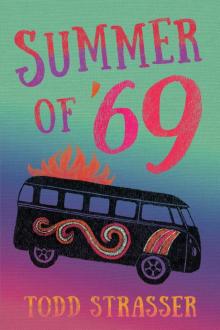 Summer of '69
Summer of '69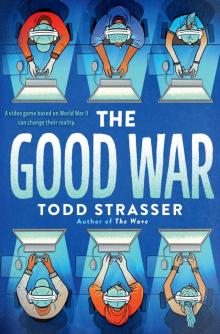 The Good War
The Good War Famous
Famous If I Grow Up
If I Grow Up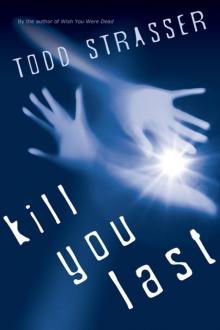 Kill You Last
Kill You Last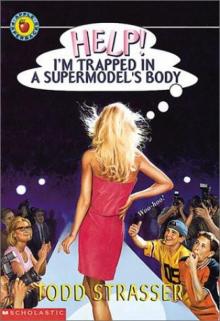 Help! I'm Trapped in a Supermodel's Body
Help! I'm Trapped in a Supermodel's Body Price of Duty
Price of Duty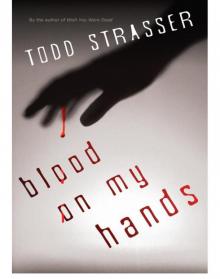 Blood on My Hands
Blood on My Hands Help! I'm Trapped in My Sister's Body
Help! I'm Trapped in My Sister's Body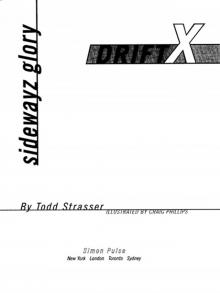 sidewayz glory
sidewayz glory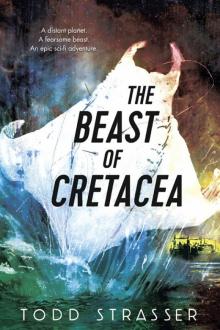 The Beast of Cretacea
The Beast of Cretacea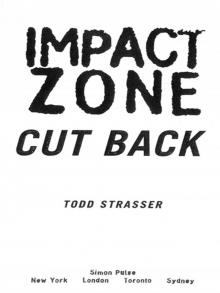 Cut Back
Cut Back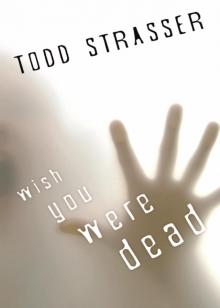 Wish You Were Dead
Wish You Were Dead The Wave
The Wave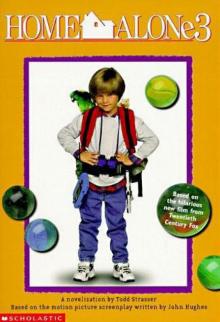 Home Alone 3
Home Alone 3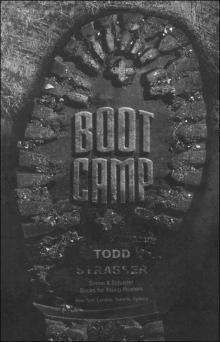 Boot Camp
Boot Camp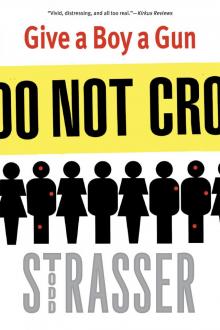 Give a Boy a Gun
Give a Boy a Gun Home Alone 2
Home Alone 2 The Shore
The Shore Can't Get There from Here
Can't Get There from Here Home Alone
Home Alone Close Out
Close Out No Place
No Place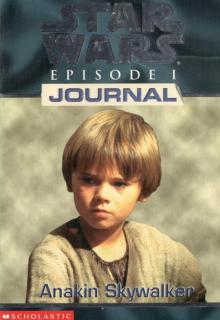 Star Wars - Episode I Journal - Anakin Skywalker
Star Wars - Episode I Journal - Anakin Skywalker